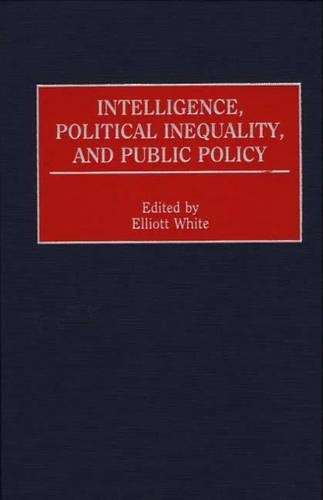
Intelligence, Political Inequality, and Public Policy
(Hardback)
Publishing Details
Intelligence, Political Inequality, and Public Policy
By (Author) Elliott White
Bloomsbury Publishing PLC
Praeger Publishers Inc
30th May 1997
United States
Classifications
Tertiary Education
Non Fiction
Central / national / federal government policies
320.01
Physical Properties
Hardback
208
Description
This timely book deals directly with a topic increasingly in the news and on the minds of policy makerspolitical inequality. It is no coincidence that the official theme of the 1996 meeting of the American Political Science Association is the issue of political inequality. Drawing together a number of the leading writers on the topic, White provides a full and serious examination of the biological and environmental factors that may be involved. In looking at these factors, the book opens up new paths of exploration for political science, including the consideration of the role of the pariah variable of intelligence. A major work that researchers and policy makers of both liberal and conservative persuasion will need to confront.
Reviews
[T]his collection of essays adds considerably to the controversy surrounding issues of race, intelligence, and public policy. Arguing that a biological orientation to intelligence is increasingly supported by research, the authors present substantial evidence for the prevalance of the hypertrophic 'Matthew effect, ' where natural differences are exaggerated by self-selection of environments, such as the 'brain drain, ' or its opposite, the 'brain gain, ' where talented people gather in informal 'universities' such as Harlem in the 1920s or Silicon Valley tody. The most perplexing issues arise from the unintended impact of liberal democracy and the free market in contributing to this inequality.... the book looks at not only genetic and social factors contributing to inequality, but also neurobiological factors and those attributable to the physical environment... The volume effectively challenges the belief that mass literacy, education, and exposure to technology will lead to equality, but stops short of providing viable alternative public policy suggestions.-Choice
"This collection of essays adds considerably to the controversy surrounding issues of race, intelligence, and public policy. Arguing that a biological orientation to intelligence is increasingly supported by research, the authors present substantial evidence for the prevalance of the hypertrophic 'Matthew effect, ' where natural differences are exaggerated by self-selection of environments, such as the 'brain drain, ' or its opposite, the 'brain gain, ' where talented people gather in informal 'universities' such as Harlem in the 1920s or Silicon Valley tody. The most perplexing issues arise from the unintended impact of liberal democracy and the free market in contributing to this inequality.... the book looks at not only genetic and social factors contributing to inequality, but also neurobiological factors and those attributable to the physical environment... The volume effectively challenges the belief that mass literacy, education, and exposure to technology will lead to equality, but stops short of providing viable alternative public policy suggestions."-Choice
"[T]his collection of essays adds considerably to the controversy surrounding issues of race, intelligence, and public policy. Arguing that a biological orientation to intelligence is increasingly supported by research, the authors present substantial evidence for the prevalance of the hypertrophic 'Matthew effect, ' where natural differences are exaggerated by self-selection of environments, such as the 'brain drain, ' or its opposite, the 'brain gain, ' where talented people gather in informal 'universities' such as Harlem in the 1920s or Silicon Valley tody. The most perplexing issues arise from the unintended impact of liberal democracy and the free market in contributing to this inequality.... the book looks at not only genetic and social factors contributing to inequality, but also neurobiological factors and those attributable to the physical environment... The volume effectively challenges the belief that mass literacy, education, and exposure to technology will lead to equality, but stops short of providing viable alternative public policy suggestions."-Choice
Author Bio
ELLIOTT WHITE is Professor of Political Science at Temple University. He is the author of Genes, Brains, and Politics (Praeger, 1993) and The End of the Empty Organism (Praeger, 1992) as well as the forthcoming Balkanized Global Village.
